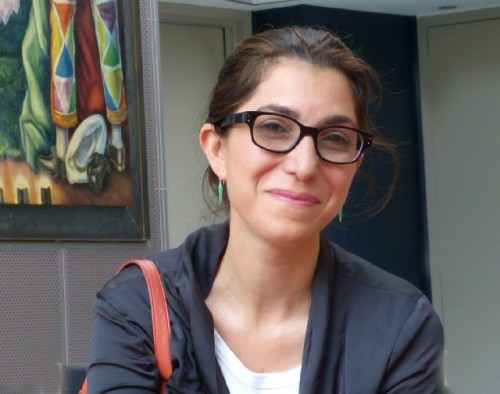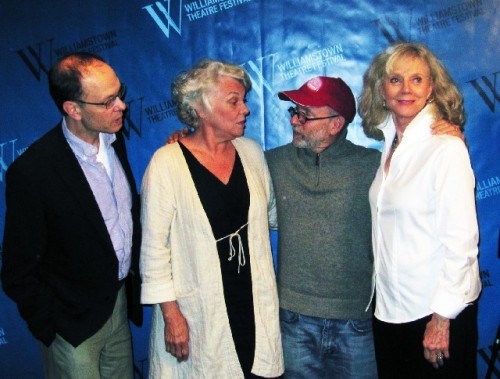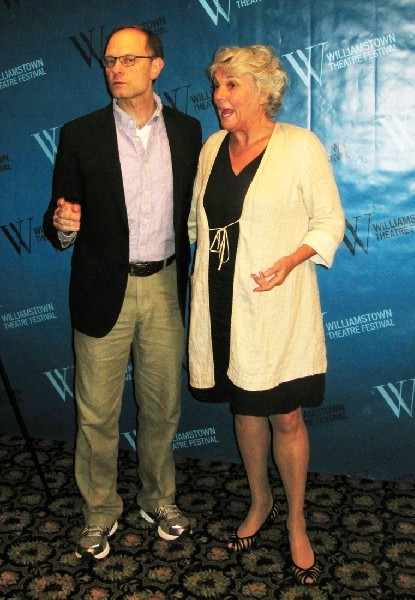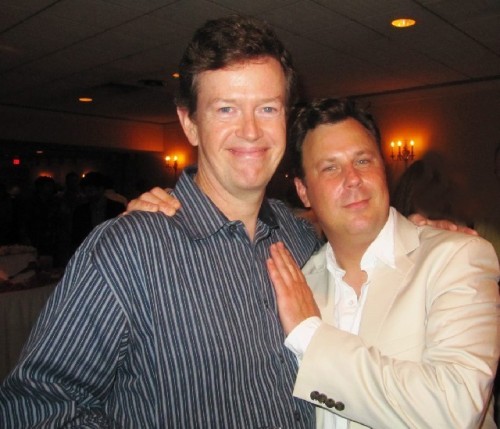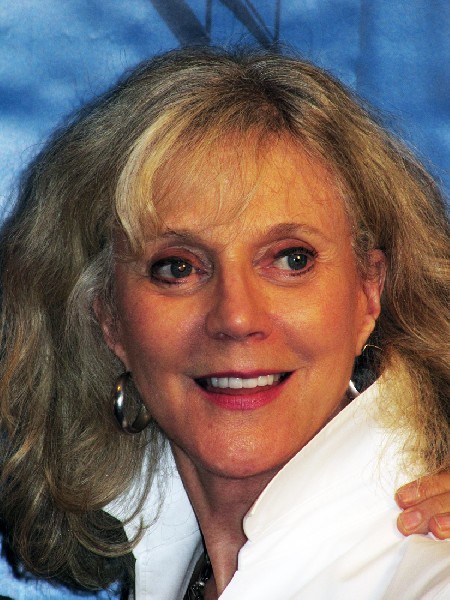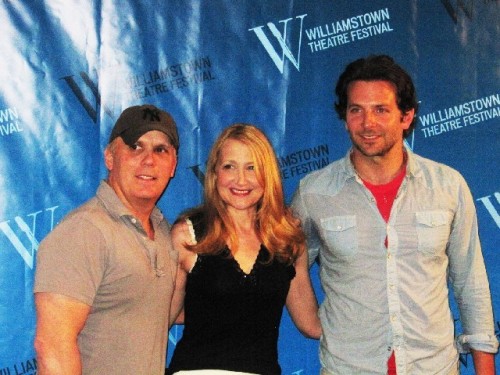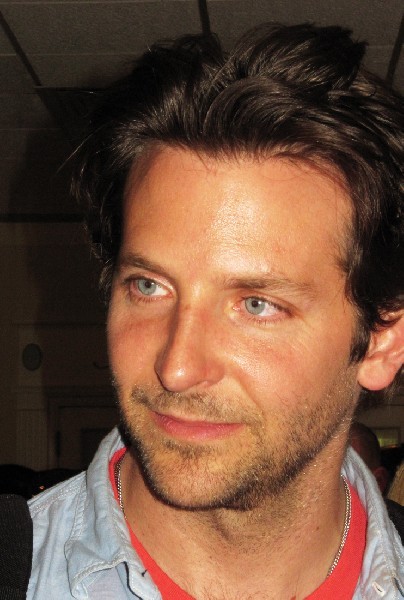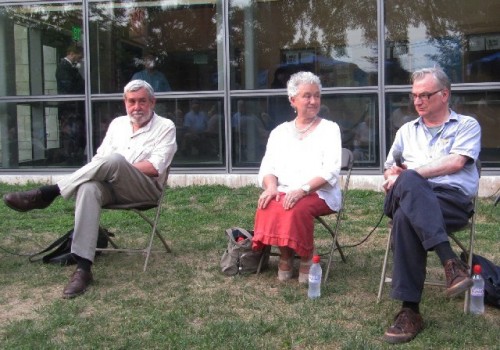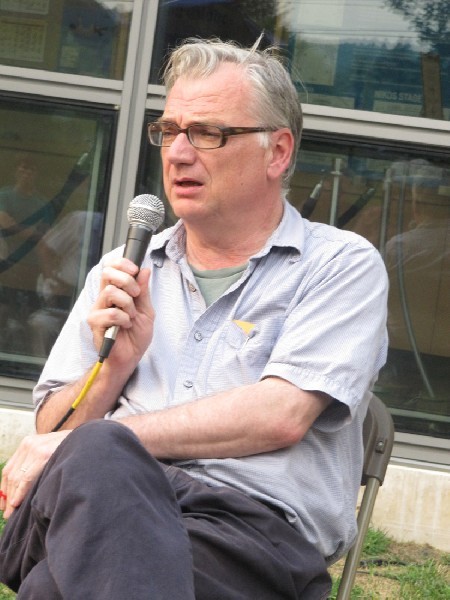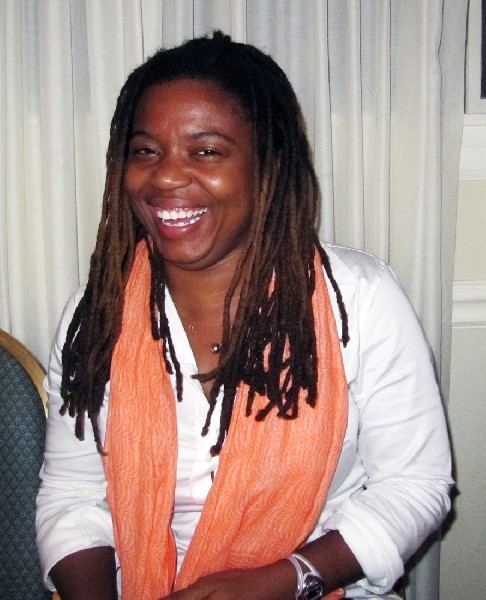Jenny Gersten Part Two
Discussing Her Second Season at WTF
By: Charles Giuliano and Jenny Gersten - Aug 13, 2012
Charles Giuliano This is now the end of your second season as artistic director of Williamstown Theatre Festival. What’s the learning curve? How is this season different from last year?
Jenny Gersten I took a lot of what I learned from last year and applied it to this year. There’s different institutional stuff that I learned. Programming is always a big puzzle. I Think this season went smoother for us as an institution. Hallelujah. He raised his hands to the sky readers. (Laughs) I’m learning about the spaces. What works in them and what doesn’t. Where I can push the boundaries and where I can’t. There’s a lot of what I learned last year that is applied to this year and I’m learning a lot this year.
CG There was a lot of ambition last year but I don’t think it always worked. Last summer Robert Falls directed Three Hotels for WTF. We were in Chicago in June and saw Iceman Cometh which he directed at the Goodman. I’m in the midst of publishing a dialogue with John Douglas Thompson who played Joe Mott in that production. He talks a lot about Falls and his brilliance as a director.
JG David Cromer, who is also from Chicago, was here doing Streetcar Named Desire. They were both here at the same time.
CG You took chances. I don’t think that Streetcar worked.
JG Yeah.
CG The staging of it was problematic. For Doll’s House there were obstructed view seats.
JG Yeah.
CG I give you credit for ambition. I’ve gone on record about Ten Cents a Dance. Some people loved it. The New York Times and Wall Street Journal did. I didn’t. You took a lot of chances last summer but I don’t think they always landed. You got in the middle of a firestorm with the critical community because there were all over the map responses to what was going on. That’s where we got embroiled. It seemed like you took a lot of that personally.
JG Oh really!
CG You seemed under attack. The institution was a part of that in how it responded to some of the negative reviews. I think you did the same thing this year but it worked.
JG You mean in terms of the ambition? Just to clarify. We did the same thing year in terms of response?
CG No.
JG You mean in terms of ambition.
CG I have to say a lot of the things you did last year weren't successful. I don’t think you did anything different this year, in terms of ambition, but it worked.
JG Ok.
CG It’s hard to explain. It’s complex. Did Jenny go back to the wood shed and lick her wounds? Think about it and come back tougher and stronger? Which I would like to think. There were learning curves in not wanting to have those same things happen again. Is that fair? Or is it just off the wall?
JG When you’re in charge of creating artistic projects they can go any way. You don’t know how they’re going to go. You put people in a room and hear what they’re thinking. Whatever comes out comes out. It’s like cooking. You make dish a hundred times. 99 times it works and then once it doesn’t work. For reasons of proper temperature, you got disrupted by a phone call, or whatever else happens.
CG Tyne Daly addressed that nicely. When I spoke to David Hyde Pierce about creating a soufflé of Importance of Being Earnest, she said that sometimes it ends up as an omelet, but you scoop it up, and it still tastes good.
JG That’s true. (Laughs) I loved that response. I don’t think there was so much wood shedding and wound licking. What we were doing last year was making a statement about what Williamstown Theatre Festival is like these days. I don’t really want to say “Under Jenny Gersten.” But in terms of the tone and the kind of work we’re trying to do here. We were sending out a signal. No matter what people thought of what the end results were, people came away from Williamstown, and as you said, there were many different responses, but people came away from Williamstown saying “That’s a place where I want to work.” We reaped the benefits of that this year.
CG From the artists’ point of view you were risk taking and they wanted to be a part of that? Even though, from a critical point of view, the reception was inconsistent. So the artists see you more as a risk taker than whether you win or lose?
JG I think that’s right. I think the reason people come here, no offense, is to be protected from the critics in a lot of ways. And to take chances in a lot of what they can’t do in other places where the spotlight is a lot brighter. If that makes sense.
CG Far from Heaven (a new musical this summer) was not open to the national press.
JG Same with Elephant Man (Bradley Cooper and Patricia Clarkson). I don’t think Bradley would have done Elephant Man here if the national press was invited. That was a specific agreement we had with the author actually.
CG That kind of answers the question of why we haven’t seen much of the New York media here this summer. Compared to last year.
JG Yeah.
CG Last year you had the blown up reviews plastered all over the lobby. “Loved it” the New York Times.
JG Wouldn’t you do that?
CG I don’t know. How about “Hated it” Berkshire Fine Arts.
JG Now that we wouldn’t put up. (Laughs)
CG Could a thoughtful negative review be of value? It gets people talking about a show.
JG It doesn’t generate ticket sales which is part of our business. Negative reviews? In my experience they don’t generate ticket sales.
CG So then, what’s happening with A Month in the Country?
JG I don’t understand the question.
CG There have been negative reviews.
JG And?
CG How are ticket sales?
JG They’re mediocre.
CG Did you go into the project knowing it would be a tough sell?
JG I didn’t know it would be as tough as it would. My opinion in choosing A Month in the Country for the Williamstown Theatre Festival was based on a legacy of doing a lot of Russian drama. If you go back through the pages of history here there is a long legacy of doing Chekhov, Turgenev, Gorky, challenging work. I thought this translation was breathtaking. (Translated by Richard Nelson, Richard Pevear and Larissa Volokhonsky) That it would attract an actress of a certain caliber. That role is beautiful. That was my thinking on it. I thought the Williamstown audience would really gravitate to it because of the classic tradition. Especially after doing Earnest which is lighter fare, especially with the Runyon take on it. And doing Far from Heaven which is a musical. Musicals are popular but it’s a new musical. Challenging. No necessarily a known title. So I wanted to so something that felt dramatic and classical in the tradition of the theatre festival.
CG I was fortunate to attend the press conference and discussion with the director and co-translator Richard Nelson so it made me more invested in what you were trying to do. I approached the production differently from if I had not had that experience. There was a sense of what you were trying to achieve and what would happen. Actually, I was disappointed by a number of the reviews which didn’t seem to attempt to deal with the mandates of the production.
JG We’ve made efforts to educate audiences and the reviewers about what Richard’s been attempting to do. It’s been fascinating about the critical responses and it’s not just you. It’s been split almost down the middle. And for the audience as well. People will either absolutely get it and stay and love it. Or, they decide not to try. It’s been a hard show for the actors. You saw an early performance. I think it has taken time for the actors to calibrate what they are trying to do. Obviously, our process of moving into the theatre is very abbreviated. Especially with a show like this that’s so technical with the sound. It’s taken time to come around. People who saw those early shows and performances didn’t get the full value of what we were doing. What’s great now is that the word of mouth for this week has been stupendous.
CG So sales are stronger this week?
JG Yes.
CG Let’s talk about the risk taking.
JG OK.
CG You could play it safe. You could put up popular shows and sell a lot of tickets. That’s doesn’t seem difficult but you don’t seem to want to do that.
JG It doesn’t feel like it’s in the nature of what the organization is. It’s certainly not what interests me. Luckily, the board hasn’t given me that mandate to do popular shows that sold out the theater. Obviously, that’s the goal. So don’t get me wrong. I’m really interested in creating popular fare that sells out the theater. I’m not trying to not sell tickets. (Laughs) Don’t get me wrong. But I am trying to maintain some point of distinction for the artists who come here and the work they are investigating. If we happen to do that and find a show like Where’s Charlie, Anything Goes, or Funny Thing Happened on the Way to the Forum it’s a eureka moment.
CG Why didn’t you switch theaters for Elephant Man and A Month in the Country? On the Main Stage you could have sold every seat in the house for Elephant Man.
JG Perhaps. It wasn’t what that production wanted artistically. They wanted a chamber piece. It wouldn’t have felt like a chamber piece on the Main Stage. Where I felt with A Month in the Country.
CG Was a chamber piece on the Main Stage.
JG I didn’t know it would be a chamber piece. When we first talked about it. The design concept came long after we programmed it for the Main Stage.
CG Discuss that. What happens? You negotiate for one thing then end up with something else.
JG I didn’t negotiate for one thing and end up with something else. I suppose that’s true, as I didn’t expect that it would be such an intimate chamber piece. (The first three rows were removed to build a thrust in front of the stage from which the play was performed with an empty stage behind it. The actors moved a few pieces of furniture on stage and sat when not performing on the sides.) But I did feel that that play, and the people we were going to bring to that play, were Main Stage appropriate.
CG Last year it was more or less the same thing. Three Hotels would have worked perfectly well in the smaller Nikos. The three monologues were lost on that stage with its vast sets. It was beautiful but we had three monologues on a huge stage. Excuse me. What about that didn’t make sense? How do these things happen? Three Hotels was a substitution for another play which was cancelled.
JG That’s correct. It wasn’t supposed to be Three Hotels on the Main Stage so that was a last minute shift. It was something we could do quickly and cast well. That would sell tickets. And I love that play (by Jon Robin Baitz).
CG In New York this season I got to see his Other Desert Cities (Cast: Stockard Channing (Polly Wyeth), Elizabeth Marvel (Brooke Wyeth), Stacy Keach (Lyman Wyeth), Judith Light (Silda Grauman) and Matthew Risch (Trip Wyeth).
JG That was a beautiful production (produced by Lincoln Center's Bernard Gersten).
CG How do you get a Bradley Cooper to come here (Elephant Man)?
JG It wasn’t me. He wanted to come here. I get no credit for that.
CG You had the stars this year: David Hyde Pierce directing, Tyne Daly, Blythe Danner, Bradley Cooper, Patricia Clarkson, and let’s not forget Brooks Ashmanskas in Last of the Red Hot Lovers, directed by Jessica Stone, with Susie Essman. That’s pretty spectacular.
JG They all came here for two reasons in my opinion. The projects, the material. The people who were working on the shows with them. And the fact that they love to come to Williamstown.
CG Let’s talk about the selection process. How many shows a year do you see?
JG I see two plays a week in New York or travel. I go to Chicago, Boston. I went to Oregon Shakespeare last year. Sometimes Los Angeles.
CG How about London?
JG I haven’t done London in awhile. I’m due for a London trip.
CG We’re doing Dublin/ London this fall.
JG That will be a blast. I see Broadway, Off Broadway, Off Off Broadway. Then I go to New Jersey.
CG Some of your shows have been generated from readings like Last of the Red Hot Lovers at the Clark a year ago.
JG Blue Deep last summer and WHATABLOODCLOT!!!
CG How does it work for you? How are you looking at material?
JG We get a lot of script submissions every year from agents and the playwrights themselves. I read them and work with the literary associate Steven Sanders. He reads a lot of scripts and also goes to a lot of readings in New York. Between us we cover a lot more theatre. We meet and discuss that. With Last of the Red Hot Lovers that was something that the director, Jessica Stone, really wanted to pursue. So I said “Let’s do a reading and see how it goes.” That worked out. With Blue Deep same thing. The agent for the playwright came to me and said we have a play that Blythe is really interested in. She said would you do a reading this summer, and I said of course, absolutely. It would be great to have Blythe up here. With WHATABLOODCLOT!!! that was actually a play I sought out when I was talking to Katori’s agent. It was a play I thought was pretty funny.
CG Next year is the end of your contract. Will it be three and out?
JG I don’t know. We’ll see what the board says.
CG At this point it would seem they would want to have you here forever.
JG They seem very pleased with my performance.
CG You’re a talented young woman with other places to go and things to do.
JG I have no intention of leaving.
CG Can I take a picture?
JG Absolutely. Don’t forget to take the lens cap off. I’m so helpful. Always supporting artists.
CG and JG (Exit laughing)
Part One

